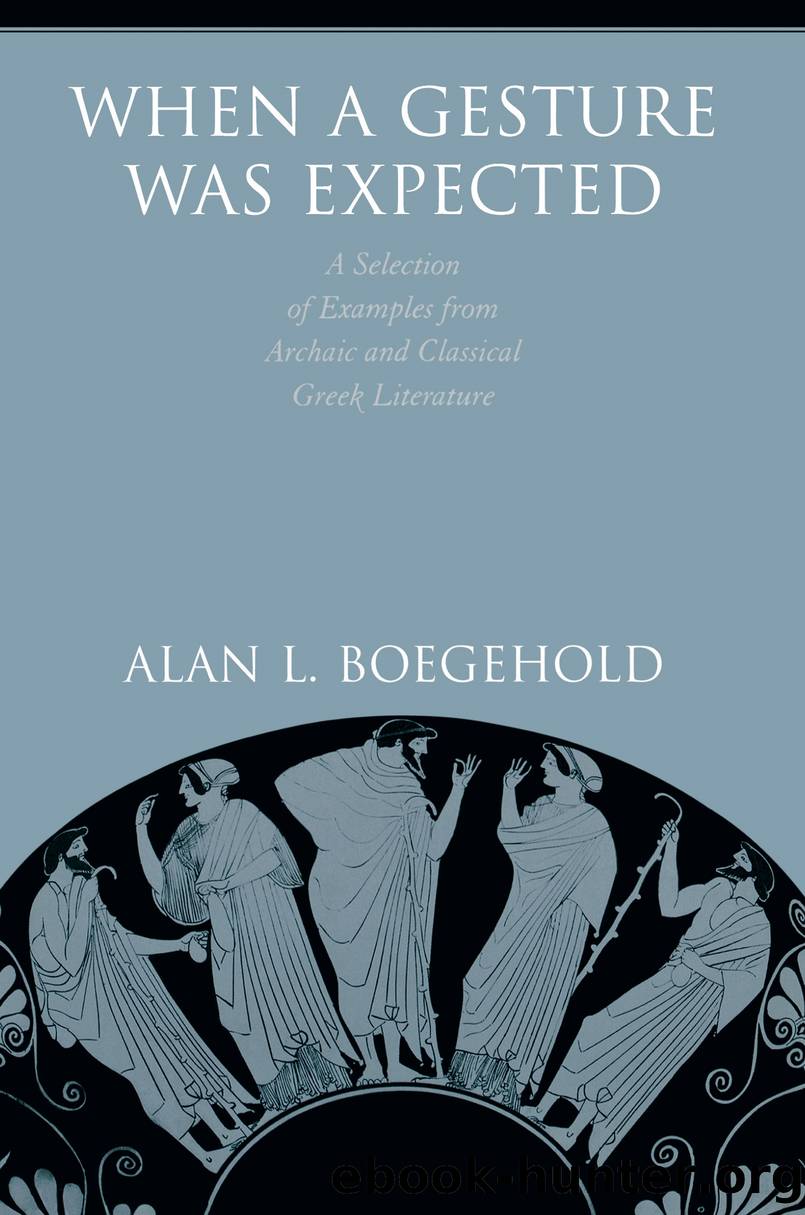When a Gesture Was Expected by Alan L. Boegehold;

Author:Alan L. Boegehold;
Language: eng
Format: epub
Publisher: Princeton University Press
Published: 2022-10-18T00:00:00+00:00
CURSES! NEW TESTAMENT, ACTS 18.6
With all the reservations one must apply in such extrapolations, the gesture one sees today appears to be a direct lineal descendant of Paulâs gesture once he was through remonstrating with the blaspheming Jews at Corinth: âHe shook out his garment and said, âYour blood be on your own head.â â31
Authoritative translations of the New Testament do not alert readers to the significance of this gesture, a reticence that is, given the exigencies of responsible translation, not only understandable but even desirable. The King James version has, âAnd when they opposed and blasphemed, he shook his raiment and said unto them â¦â The Holy Bible, Revised Standard Version, has, âAnd when they opposed and reviled him, he shook out his garments and said to them.â¦â Both of these versions give a bare and yet adequate summary of what the Greek conveys. In a third example, however, an attempt to provide lively detail by means of specificity turns out to be a misdirection. In The New English Bible, the translators import into their version more detail than the Greek warrants: âBut when they opposed him and resorted to abuse, he shook out the skirts of his cloak and said to them ⦠etc.â By adding skirts, they depict Paul symbolically shaking the dust of the road from the bottom of his long cloak.
Now Paul is uttering what could be a curse as he leaves. He is doing so more or less in accordance with instructions Jesus Christ issued to his apostles when he sent them out into the world. For Jesus told his departing apostles what to do if the people of a house or city would not accept them and would not hear their message. The apostles in that case were to leave that household or city, and as they left they were to shake the dust from their feet.32 To shake the dust from oneâs feet might seem no more than a symbolic way of saying: âI want no part of this place. I am leaving.â Indeed the text of Mark adds that they are to do so âin witnessâ (Éá¼°Ï Î¼Î±Ï±ÏÏϱιον αá½Ïοá¿Ï). But a later text suggests that the act of shaking off the dust from oneâs shoes in a particular context can be understood as a synergistic act that completes or reinforces a curse. âSt. Quintilian shook the dust from his shoes and said cursed be the house and cursed its inhabitants for eternityâ (Gregory of Tours, Life of the Fathers 4.3). If this provides the right interpretation of Jesusâ instructions, then the phrase âin witnessâ introduces the promise that the unheeding will find the day of judgment less tolerable than will the people of Sodom and Gomorrah.
To return, however, to Paul at Corinth, he is shaking out his cloak, which is equally a synergistic act that capacitates or reinforces a curse. The difference is that he is shaking his cloak and not his shoes. He is therefore not shaking the dust off, as âskirts of his cloakâ implies.
Download
This site does not store any files on its server. We only index and link to content provided by other sites. Please contact the content providers to delete copyright contents if any and email us, we'll remove relevant links or contents immediately.
Call Me by Your Name by André Aciman(20478)
Ready Player One by Cline Ernest(14625)
How to Be a Bawse: A Guide to Conquering Life by Lilly Singh(7464)
Wiseguy by Nicholas Pileggi(5757)
The Kite Runner by Khaled Hosseini(5159)
On Writing A Memoir of the Craft by Stephen King(4924)
Audition by Ryu Murakami(4917)
The Crown by Robert Lacey(4795)
Call me by your name by Andre Aciman(4671)
Gerald's Game by Stephen King(4631)
Harry Potter and the Cursed Child: The Journey by Harry Potter Theatrical Productions(4487)
Dialogue by Robert McKee(4379)
The Perils of Being Moderately Famous by Soha Ali Khan(4204)
Dynamic Alignment Through Imagery by Eric Franklin(4201)
Apollo 8 by Jeffrey Kluger(3698)
The Inner Game of Tennis by W. Timothy Gallwey(3664)
Seriously... I'm Kidding by Ellen DeGeneres(3622)
How to be Champion: My Autobiography by Sarah Millican(3578)
Darker by E L James(3507)
